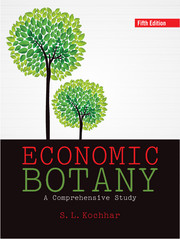Book contents
- Frontmatter
- Dedication
- Contents
- Foreword
- Preface
- Acknowledgements
- 1 Introduction
- 2 Fibres and Fibre Yielding Plants
- 3 Cereal Crops
- 4 Sugars, Starches and Cellulose Products
- 5 Legumes or Pulses
- 6 Vegetable Oils and Fats
- 7 Fruits and Nuts
- 8 Vegetables
- 9 Spices, Condiments and Other Flavourings
- 10 Fumitory and Masticatory Materials
- 11 Beverages
- 12 Wood and its Uses
- 13 Vegetable Tannins and Dyestuffs
- 14 Rubber
- 15 Medicinal Plants
- 16 Insecticides and Herbicides
- 17 Essential Oil Yielding Plants
- 18 Plant Diversity and its Conservation
- 19 Petrocrops: Our Future Fuels
- 20 Ethnobotany: An Integrated Approach
- References
- Index
11 - Beverages
Published online by Cambridge University Press: 08 February 2018
- Frontmatter
- Dedication
- Contents
- Foreword
- Preface
- Acknowledgements
- 1 Introduction
- 2 Fibres and Fibre Yielding Plants
- 3 Cereal Crops
- 4 Sugars, Starches and Cellulose Products
- 5 Legumes or Pulses
- 6 Vegetable Oils and Fats
- 7 Fruits and Nuts
- 8 Vegetables
- 9 Spices, Condiments and Other Flavourings
- 10 Fumitory and Masticatory Materials
- 11 Beverages
- 12 Wood and its Uses
- 13 Vegetable Tannins and Dyestuffs
- 14 Rubber
- 15 Medicinal Plants
- 16 Insecticides and Herbicides
- 17 Essential Oil Yielding Plants
- 18 Plant Diversity and its Conservation
- 19 Petrocrops: Our Future Fuels
- 20 Ethnobotany: An Integrated Approach
- References
- Index
Summary
The need to satisfy thirst is even stronger than hunger. Prehistoric man quenched his thirst with water, from springs, streams and pools, and it continues to be the prime thirst quencher. With the domestication of animals, the man began to share with their young some of the milk that the female produced. Man's earliest ‘beverage’ was probably the juice squeezed from fruits, but the civilized man found a vast array of refreshing and stimulating beverages for his enjoyment.
Unfermented or fresh juices (soft drinks), of course, contain no alcohol. Fruits most commonly used for preparing beverages are sweet orange, mandarin, sour lime, lemon, grapefruit, apple, mango, etc. Orange squash is the most popular of all. Fresh or bottled fruit juices are not only appreciated as an alternative to water in hot weather, but also contain useful amounts of vitamins, and contribute some calories through their sugar content. Present day soft drinks are, essentially, synthetic fruit juices compounded of sugar, fruit acids and other flavourings.
Although most adults drink one to two litres of water a day, much of this is in the form of coffee, tea, fruit juices, beer, wines, spirits or other liquids. In general, these are appreciated more for their taste and zest than for their nutritional value. Fruit juices are, of course, useful for their vitamins and potassium content. Coffee and tea by themselves have no nutritive value but may be a vehicle for large intakes of sugar, milk or lemon. The alcohol in beer, wines and spirits can serve as a source of energy.
Two important group of beverages (exclusive of soft drinks) can be recognised as alcoholic beverages and non-alcoholic beverages.
Alcoholic Beverages
Alcoholic beverages are mainly depressants that lower the activity of the brain. They are classified into two main groups, the fermented ones in which alcohol is formed by the fermentation of sugar and the distilled ones obtained by successive distillation of fermented liquors.
The fermented beverages can be further classified into two groups according to the type of plant materials from which they are derived. If they are produced from fermented fruit juices (for example, juices of grapes, apple, pear, black currants, cherry, etc.) they are called ‘wines’, whereas if they are obtained from fermented cereals they are called ‘beers’. Wines and beers are among the oldest and most cherished of the man's fermented beverages.
- Type
- Chapter
- Information
- Economic BotanyA Comprehensive Study, pp. 425 - 456Publisher: Cambridge University PressPrint publication year: 2016



